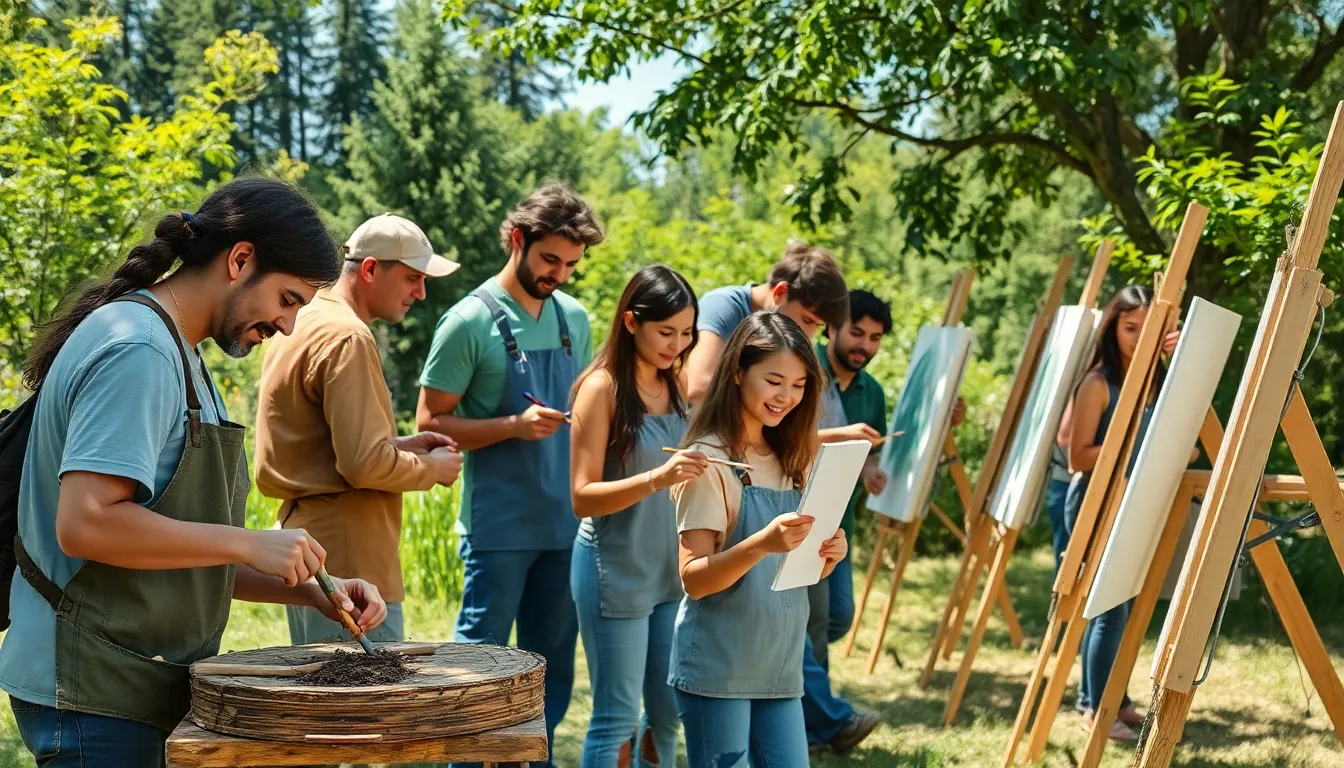In today’s fast-paced world, the allure of outdoor workshops is more compelling than ever. These immersive experiences blend creativity with nature, offering participants a chance to learn new skills while enjoying the fresh air. Whether it’s woodworking, painting, or crafting, outdoor workshops provide a unique setting that sparks inspiration and fosters community.
Imagine exchanging ideas with fellow enthusiasts under a canopy of trees or by a serene lakeside. The combination of hands-on learning and natural beauty not only enhances the creative process but also promotes well-being. As people seek meaningful experiences beyond the confines of traditional classrooms, outdoor workshops are emerging as a popular choice for those eager to connect with both nature and their creative side.
Table of Contents
ToggleOverview of Outdoor Workshops
Outdoor workshops offer diverse opportunities for individuals to engage in hands-on learning amid nature. Participants develop skills in areas such as woodworking, painting, photography, and gardening while surrounded by fresh air and scenic environments. These workshops often combine instruction with real-world practice, ensuring a deeper understanding and retention of skills.
Benefits abound in outdoor workshops. Participants experience increased creativity, enhanced focus, and improved mood due to the natural surroundings. Many workshops also promote community building, fostering connections among like-minded individuals engaged in similar interests. Group activities encourage collaboration and exchange of ideas, enriching the learning experience.
Program formats vary widely. Options include weekend retreats, one-day events, or multi-week sessions, catering to different schedules and preferences. Locations often range from serene parks and gardens to vibrant art studios near natural settings. This flexibility allows participants to choose experiences that fit their personal interests and goals.
Additionally, outdoor workshops frequently emphasize sustainability and eco-friendliness. Instructors often incorporate discussions on environmental conservation and the use of natural materials, aligning educational activities with ecological awareness. Participants not only learn new skills but also gain insights into responsible practices that benefit the environment.
Benefits of Outdoor Workshops

Outdoor workshops offer numerous advantages that enhance both personal growth and skill development. Immersive experiences in nature facilitate learning and foster a sense of community.
Personal Growth
Outdoor workshops encourage personal growth through experiential learning. Participants gain self-confidence by stepping outside their comfort zones, experimenting with creativity, and tackling challenges in a supportive environment. Engaging in hands-on activities promotes mindfulness and emotional well-being, as natural settings reduce stress and enhance mood. Group interactions foster friendships and strengthen social skills, creating lasting connections among like-minded individuals.
Skill Development
Skill development thrives in outdoor workshops due to their practical, hands-on nature. Participants learn various skills, such as woodworking, painting, and gardening, through direct instruction and practice. This format allows for immediate application, reinforcing knowledge retention. Instructors often provide personalized feedback, facilitating tailored learning experiences. Exposure to diverse techniques and materials broadens participants’ skill sets while nurturing creativity and innovation.
Types of Outdoor Workshops
Outdoor workshops come in various forms, catering to diverse interests and skill levels. Each type offers unique experiences and opportunities to learn in a natural setting.
Nature and Environment
Nature and environment workshops focus on ecological education and hands-on activities. Participants engage in activities like birdwatching, plant identification, and habitat restoration. These workshops often include lessons on local ecosystems, wildlife conservation, and sustainable practices. For instance, participants may learn about permaculture in gardening workshops or explore soil health in agricultural settings. Such immersive experiences deepen participants’ connection to the environment while fostering a sense of stewardship.
Arts and Crafts
Arts and crafts workshops provide creative outlets amidst breathtaking surroundings. Participants explore various mediums, such as painting, pottery, or photography, using the natural landscape as inspiration. Workshops often cater to different skill levels, offering guidance to beginners while challenging more experienced artists. For example, a painting workshop may focus on landscape techniques, while photography sessions teach composition and lighting skills. These creative experiences not only enhance artistic abilities but also encourage self-expression and mindfulness.
Survival Skills
Survival skills workshops equip participants with essential knowledge and techniques for outdoor living. From building shelters to finding food and water, these workshops emphasize practical skills in real-world scenarios. Participants practice navigation, fire-making, and first aid in controlled environments. For example, workshops may focus on wilderness first aid or foraging for edible plants, ensuring that participants develop a well-rounded skill set. These experiences foster resilience, confidence, and a deeper understanding of nature’s resources.
Choosing the Right Outdoor Workshop
Selecting the right outdoor workshop involves assessing personal interests and practical factors to ensure an enriching experience. Participants should evaluate various elements that align with their goals and preferences.
Factors to Consider
- Location: Opt for venues that connect with nature, such as forests, parks, or beaches. Consider proximity to home or travel arrangements for destination workshops.
- Duration: Workshops vary in length, including weekend retreats and single-day events. Align the schedule with personal availability and commitment levels.
- Skill Level: Identify workshops that match existing skills, from beginner to advanced. Many programs offer different levels to facilitate appropriate learning pacing.
- Instructor Expertise: Research instructors’ backgrounds and qualifications. Experienced instructors enhance the learning experience by providing insightful guidance and feedback.
- Curriculum Focus: Review the curriculum to ensure it includes desired topics and hands-on activities. Explore workshops that emphasize practical applications and create opportunities for creativity.
- Group Size: Consider the number of participants. Smaller groups often allow for personalized attention and interaction, enhancing the overall experience.
- Sustainability Practices: Choose workshops that prioritize eco-friendliness and sustainability. Programs incorporating responsible practices contribute to environmental stewardship and awareness.
Popular Providers
- Outdoor Education Centers: Institutions like the Sierra Club and Outward Bound offer structured outdoor workshops focused on environmental education and adventure skills.
- Art Retreats: Organizations such as The Art of the New England offer immersive creative experiences that combine artistic instruction with outdoor surroundings.
- Community Workshops: Local parks and recreation departments often host workshops covering various skills, including gardening, photography, and survival skills, allowing community involvement.
- Private Instructors: Many skilled individuals offer workshops through platforms like Meetup or social media, providing unique, personalized experiences tailored to specific skills.
- Eco-Tourism Companies: Several eco-tourism organizations provide workshops that teach sustainable practices while exploring natural landscapes, reinforcing the connection between skill development and environmental responsibility.
Outdoor workshops present a refreshing way to learn and grow while connecting with nature. They not only enhance creativity and focus but also foster a sense of community among participants. By stepping outside traditional classrooms, individuals can engage in hands-on activities that promote personal development and well-being.
With a variety of formats and subjects to choose from, there’s something for everyone. Whether someone seeks to hone artistic skills or learn essential survival techniques, outdoor workshops provide a unique blend of education and experience. Embracing these opportunities can lead to lasting memories and valuable skills that extend far beyond the workshop itself.




